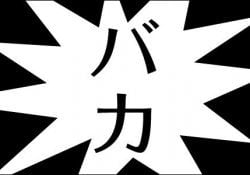know how to say "Why?" In japanese? In this article, we are going to talk about the two most popular ways of expressing whys and their differences, we are going to talk about the famous “doushite" [どうして], "naze"[何故] and nande [なんで].
We previously wrote an article talking about the differences between nande, nani, nanda and derivatives. Where do they mean "what?", "which", "how", etc. There we also briefly mention doushite and naze.
Índice de Conteúdo
What does Doushite mean?
Depending on the situation, Doushite [如何して] pode significar porquê; por qual razão; para qual propósito; para quê; como; de que maneira; por que meios. Doushite It's not so formal, but it's not informal either.
The word doushite It also has other uses and additions. You can say for example, doushitemo [どうしても] que significa não importa como; por todos os meios; a qualquer custo; certamente; de forma alguma; em nenhum caso; querendo ou não; eventualmente, etc.
The ideogram [如] present in doushite [如何して] passes a similarity meaning, as, as if, better and equal. There is also the word Ikan [如何] written with the same characters and means how, in what way and circumstances.

The word doushite [どうして] is literally the junction of the word dou [どう] which means as; in what way, together with shite [して] which is the suru verb. So much so that the word dousuru [どうする] which means "What to do?".
There are variations like doushita and doushitan [どうしたの] which means "What's the matter?", "What's wrong?", "What's wrong?", "What happened?" and "Somehow"...
What does Nand mean?
This is the most comprehensive way of saying why, and also the most informal. Not to be confused with nandesuka [なんですか], since the present in the expression refers to the particle in [で].
The nande It's the most informal way of all. You should only use it among close friends and in very informal situations. O doushite it sounds a little more informal and can be used with teachers, bosses and older people, if you have a little intimacy.
There are other expressions derived from nande as nandemonai [なんでもない] which means is nothing or insignificant. not to be confused nande with nanda [なんだ] which means "what?".

What does naze mean?
Depending on the situation, Naze [何故] significa porquê; como; de que forma; por que motivo. Essa é a maneira mais formal de expressar porque ou como. Não se usa essa forma com amigos íntimos ou dependendo da situação.
If you need to be a lot more formal, please use nazedesuka [何故ですか] instead of just naze. Maybe it's a little rude to just use naze in a very formal situation.
The word nazenara [なぜなら] literally means reason and why. The expression nazeka [なぜか] não é uma pergunta e significa alguma forma; por algum motivo; sem saber porquê e pela razão.

The article is still halfway through, but we recommend also reading:
What is the difference between Naze x Doushite and NANDE?
Although they both mean almost the same thing, naze seems to be more of a why than doushite. The word doushite is more informal and can convey an idea of "as" or "What do you mean?".
Doushite ends up being used when talking directly to someone, when you directly ask the person what happened or what the problem is. Already naze is used as a simple why.
you won't say doushite when your boss doesn't want to increase your salary. You can say doushite if your boss is going through a situation, you have a certain intimacy and are trying to understand what happened and why he is upset.
Reaffirming and summarizing: Naze is closer to why and dohshite is closer to as... Nande it's very informal and chaotic, but it's very common to hear.
Think on the bright side, at least we don't have 4 whys in Japanese the same as in English. Fortunately, the why options do not force us to understand the writing and form of the sentence. Just remember the best time to use.







